
My colossal ignorance about this nation of islands when I was planning the trip resulted in some interesting surprises. Initially, the impetus to stop here was prompted by my reading about an underwater restaurant (food again) where one can watch colorful tropical fish swimming around while you eat. When I looked up its location, it was on the way from Thailand to Africa, which seemed like good timing for a little rest between the hot and humid chaos of SE Asia and our coming travels in Africa. So we included a stop here in our flight itinerary and I would figure out the details of our stay later. However, when I really zoomed in on the Maldives to plan those details, I found out that there are about 1200 islands, all of them pretty small, that make up 26 atolls covering almost 300 km2 of the Indian Ocean. Only about 200 of the islands are inhabited by Maldivians and another 80 or so have been turned into fancy resorts, those over-the-water-bungalow type of resorts that cost $700 a night for a cheap one. The restaurant was, of course, located on one of the resort islands and we were NOT going to pay that kind of money just to eat in an underwater aquarium, especially since the reviews I found all talked about how expensive even a lunch at the restaurant cost (>$250) and none of them raved about how good the food was. Soooo, we booked a room in a little guesthouse on a little island called Fulidhoo and it turned out to be a most wonderful surprise.
After a long day of traveling from Thailand, we arrived at our hotel in Male where we would stay overnight before taking the ferry to Fulidhoo. The receptionist wanted to know which island we were going to and which ferry we would be taking so she could arrange a ride for us in the morning. I had no idea there was more than one ferry leaving from more than one wharf or that there were so many islands that she wouldn’t know how we would get to Fulidhoo. (I did mention colossal ignorance, didn’t I?) Thank heavens for wifi even on remote islands. Eventually, we reached the host at our guest house and got that sorted out. I also asked him whether we should get a taxi to the guest house and he said not to worry, they would meet us at the ferry. Exhausted but much reassured, we fell into bed after midnight.
It turned out that you take the Villigilli ferry to get to Fulidhoo (don’t you just love those names -- made me want to learn to speak Maldivian). The ferry ride was quite an experience by itself. Our tickets cost a whopping $3 each. When we arrived at the wharf, big burly guys were loading piles and piles of boxes onto the ferry, mostly food by the looks of it.

As we boarded, they also made a heap of our luggage in the aisle. The piles looked very haphazard but we realized when we hit some rough water that they were way more stable than neat piles that would slip and slide, which some of the luggage did at one point, so they messed up the pile a little more and wedged things in. There was definitely some method to the madness.
On the 3½ hour ride, we passed a few small uninhabited islands.
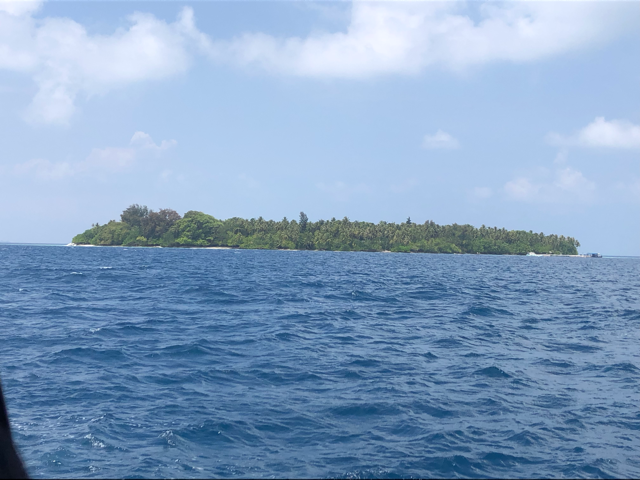
Eventually, we pulled into the lagoon at Fulidhoo Island and got our first glimpse of that amazing blue water.
There were quite a number of people on the wharf waiting. One man held a sign with the name of our guest house, Sancia Lodge, and we excitedly greeted him. He proceeded to wordlessly grab our bags from us, carry them to the end of the pier and dump them in a wheelbarrow -- this turned out to be the “taxi.”

The host of our guest house, Tea, and his Italian girlfriend, Christine, were also there to welcome us. We all proceeded to walk about 180 meters to the other side of the island on a sandy path to the Sancia Lodge, a tiny place with just three guest rooms. During this stroll, I started to realize the extent of my ignorance and to recalibrate my expectations. I was not expecting a fancy resort, but I was also not expecting the remote, tiny island in which we found ourselves.
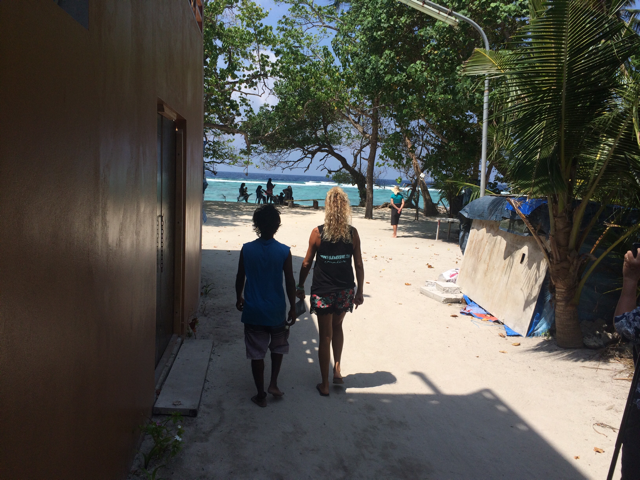
The entire island is 600 meters by 200 meters, so, even with my injured knee, we walked around the entire landmass in about forty minutes. There is a muslim village with a few tourist shops on the island, but there are only a couple of restaurants, one of which was rarely open and the menu warned that you should order one hour ahead for dinner. We never did eat there. We ate lunch at the other one on our first day. We asked for banana smoothies and then we saw our waiter leave and wondered who was making our smoothies. In about ten minutes, he returned with a bunch of fresh bananas and in about five minutes we had our smoothies.
Our guest house provided breakfast each day cooked by our “taxi driver” who also seemed to be the general housekeeper. He was shy about speaking in English at first but we gradually learned that he was from Pakistan and had come to the Islands to find work. We wondered if he felt lonely there but he said there was a group of his fellow countrymen on Fulidhoo for the same reason. We quickly learned to order the Maldivian version of breakfast that consisted of chapatis and a tuna/onion/lemon mixture that was nutritious, refreshing and delicious.
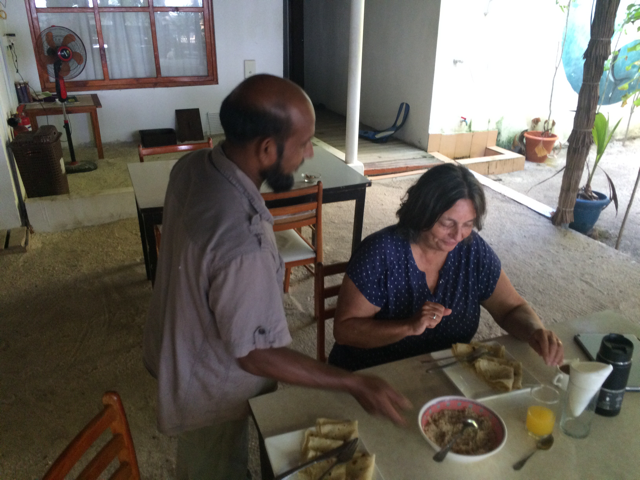
They offered us dinner as well and we had several versions of fish -- fried, curried, and grilled. It turns out that Tea, our host, is a fisherman and brings in a fresh catch each day of wahoo, a local tuna-like fish. Can’t get much fresher than that.
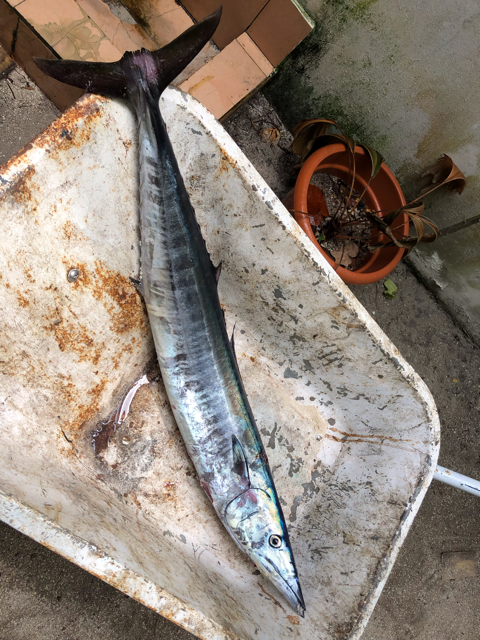
Tea is a tiny, wiry guy (see him next to David in the photo below). In addition to fishing, he is a diver. He grew up on an island in one of the northern atolls, probably about as far north of Male, the capital, as we were south of it. And there are vast stretches of the country further north and south. This has been an independent nation, almost continuously, for over a thousand years. We marveled at how a group of islands so widely dispersed could have been united under one ruler when people had to travel by wind or paddle. Tea said that it would probably have taken about three months to sail in a small craft from his home island to the capital before there were power boats. I also wondered whether life on such a tiny island would feel confining, but as we got to know Tea, I realized that his life is lived as much, or more, in the water as it is on land -- and the ocean is limitless. I also began to realize that the nation does not consist of small bits of land separated by water, it is an expanse of water with many, many landing spots.
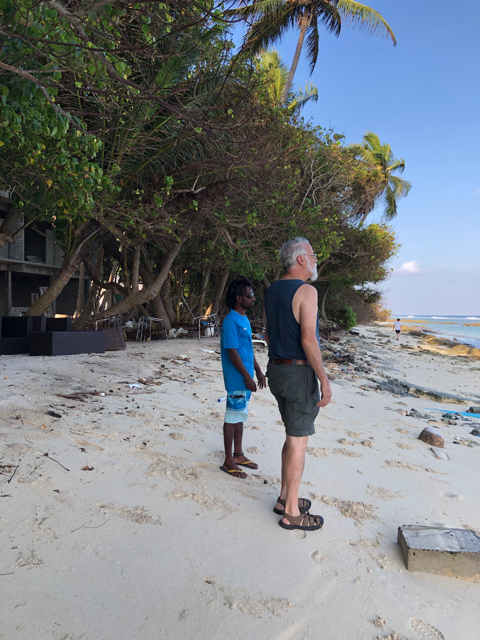
Following Islam teachings, dogs are not allowed on the island. However, Christina had adopted a mama cat that had two kittens, which were a constant source of entertainment.
We spent three days swimming in the warm water, reading and blogging, strolling around the small island, and slowing down. We gradually sank into “island time” and didn’t really care much how we passed the time. Below is a slideshow of several photos. Click on the side arrows on the edge of the photo to see more.
Our lodge was tucked away behind a protective hedge of greenery on the outside of the island facing the ocean rather than the calm, shallow lagoon. The beach was rocky and the water was rough. Each evening, we would take a walk out to the beach to listen to the waves and gaze at the stars for a few minutes. Then turn around and return to our cozy little retreat for the night.
With no motor vehicles on the island, no airport nearby, no dogs allowed and only the occasional purr of a motorboat in the harbor, we grew used to the gentle hypnotic sounds of the breeze blowing, the birds calling, the waves washing against the shore, the whirring fans. So you can imagine the shock to our systems one soporific afternoon on the terrace of our banana-smoothie restaurant when a cacophony erupted down the street. Loud, lively music started blaring around us and seemed to be moving closer. It was too small of a place for a big parade and we were at a loss to explain the cause of the sudden change in this drowsy little island. Turns out it was politics. A small group was plastering campaign posters on the walls accompanied by a trailer with loudspeakers blasting the music. Can’t get away from politics -- even in paradise.
On our route from the guesthouse to the tourist beach, we passed the local elementary school that serves families from neighboring islands as well. It was closed for a school break so we didn’t see any children but, being retired educators, we were impressed with the guiding principles illustrated on the walls -- practicing Islam, using sustainable practices, preserving diversity, care and compassion, participation and contribution, tolerance.
The first two days of our stay on Fulidhoo, the ocean was a little rough due to the weather, but on the third and last day, Tea thought it was calm enough to take us out snorkeling on the reef. However, when we went to board the boat I realized I would never be able to get out of the water and back up the little ladder into the boat given my bad knee. So, instead, Tea took us to the harbor where we could walk into the water from the beach and snorkel above a small patch of reef among the boats. I don’t know what we missed, but what we did see was extraordinary enough. I saw clownfish and “Dory” fish and schools of silvery fish -- so beautiful. I was sorry not to have an underwater camera.

We also saw stingrays swimming along the shore, apparently waiting for feeding time. One of the locals offers them treats to bring them into shore for the tourists to “pet.” We kept our distance.
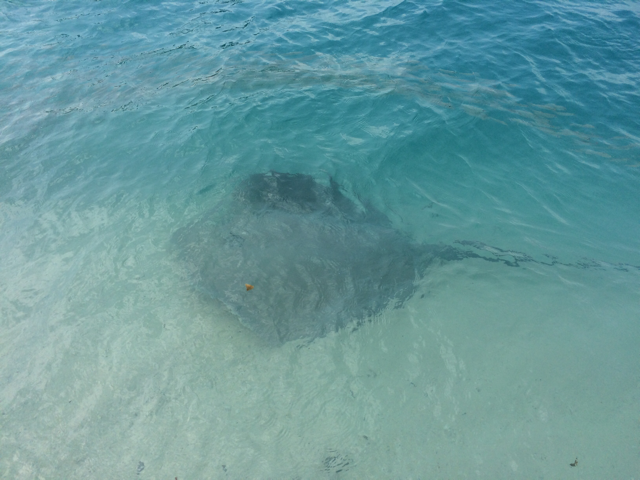
Afterwards, Tea bought us coffee at the restaurant we never ate at and took our photo for us under the beautiful palm tree on the beach.
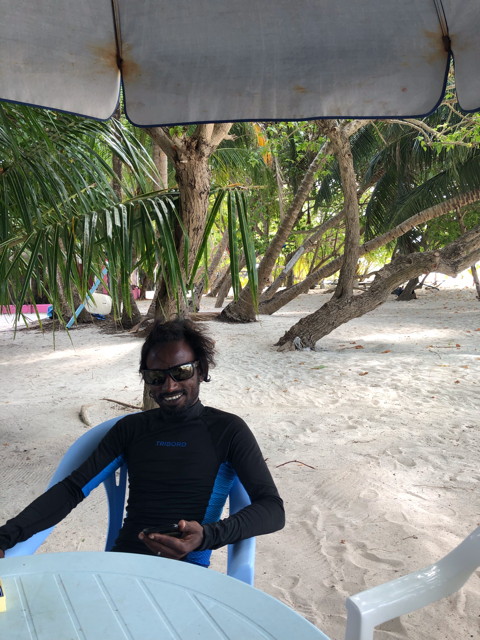
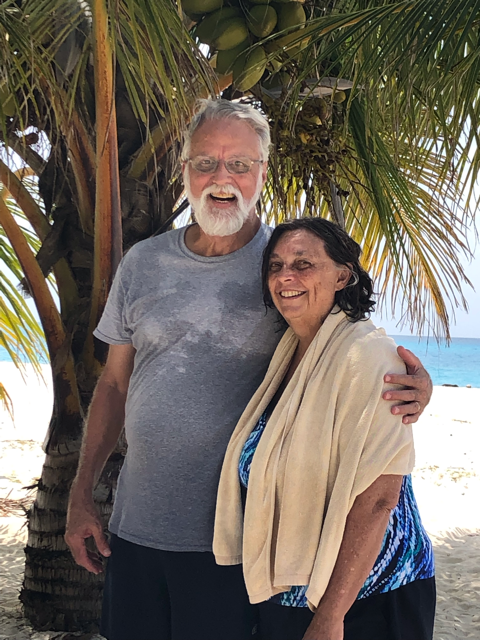
In the evenings, locals and tourists gather on the harbor beach to wait for the sunset. The air is cooling off at this point, and the children start up a football (soccer) game while the adults chat in small groups or set up their cameras. When it comes, it is a fittingly gorgeous sunset for this achingly beautiful bit of earth. Hopefully, rising sea levels won’t obliterate it in the next decade but I fear for this nation of tiny islands and gentle people.
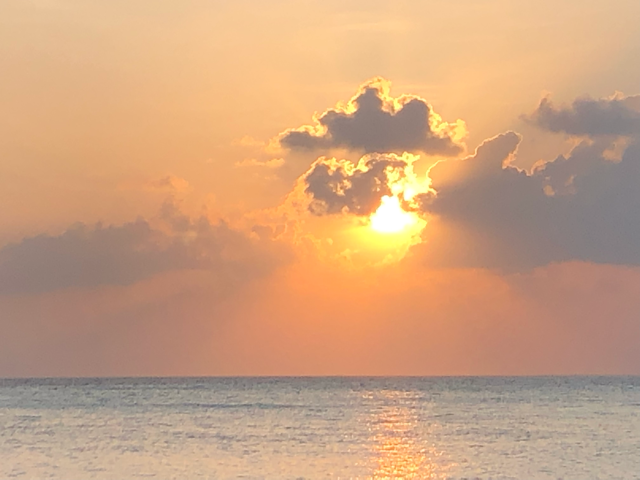
I am glad, now, of my initial ignorance so that every moment was a delightful surprise. However, even if you visit Fulidhoo after reading this, I am sure you will also have a great experience all your own.
For our next adventures, we are off to Botswana for a bush safari and more delightful surprises.















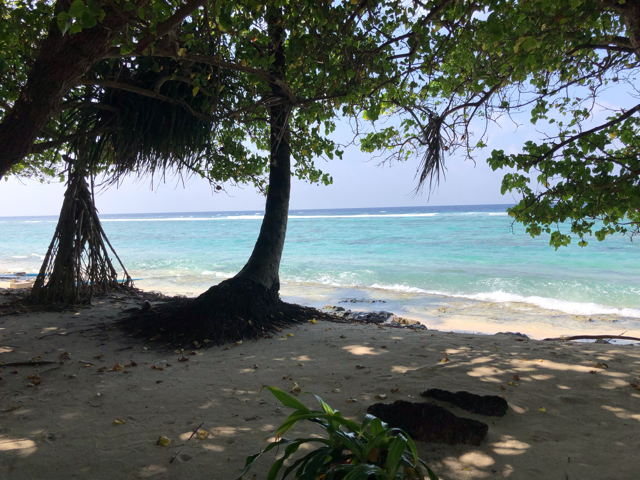

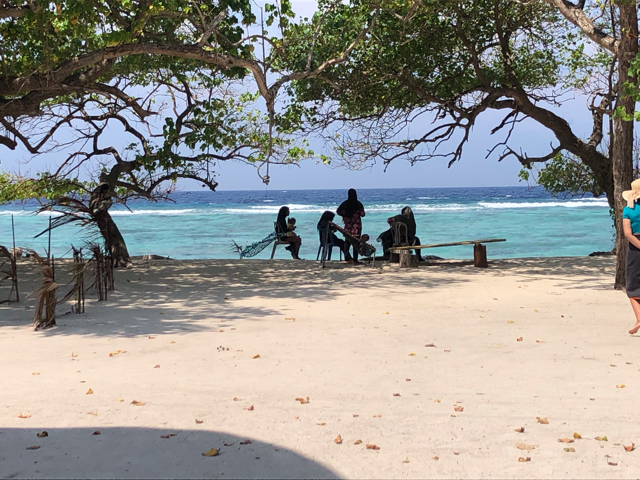

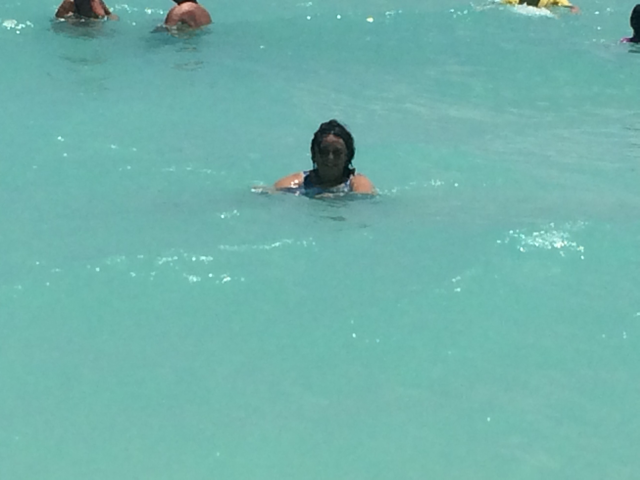

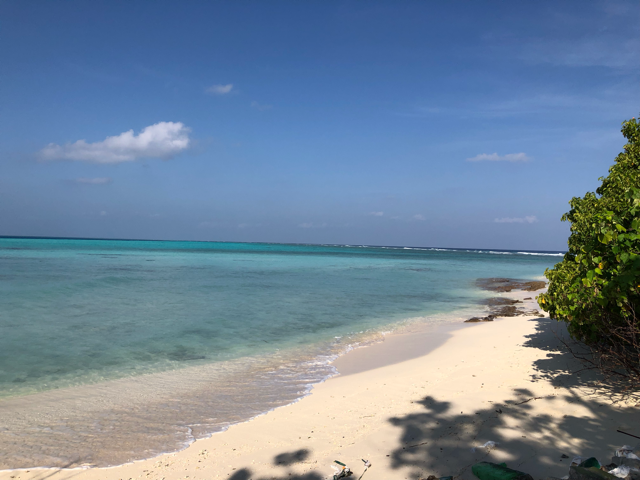

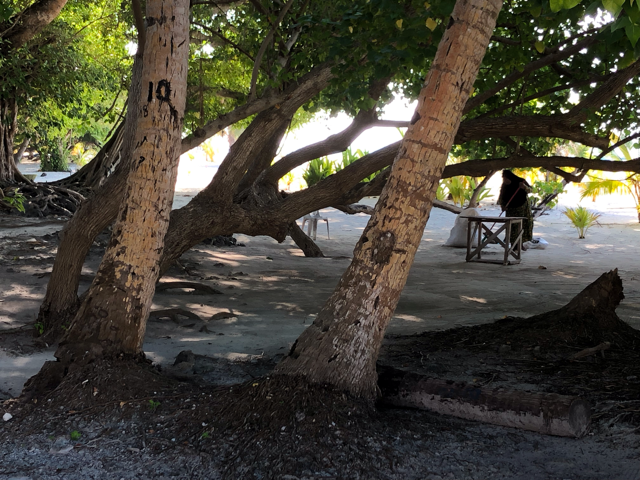



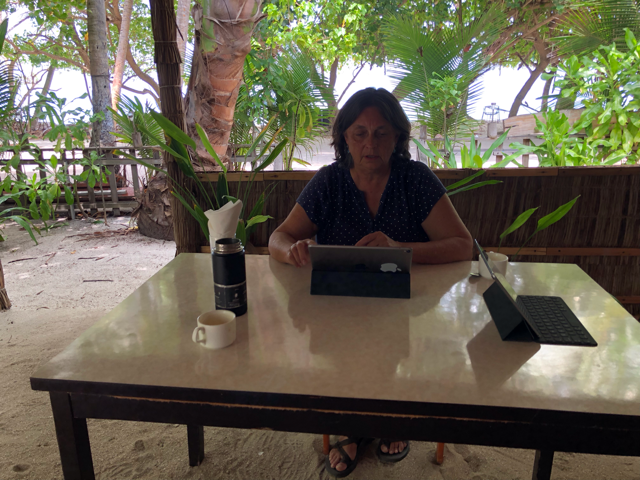


















Comments